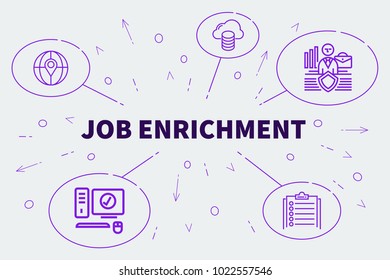Job Enlargement – It is a
technique of job design, in which the number of tasks associated with a job is
increased to add greater variety to activities, thus reducing repetition. It
refers to having additional duties and responsibilities in a current job
description. And we can say that job enlargement is a horizontal expansion of
duties and tasks across the same organizational level.

Example – A person hired to handle the customer care executive
work is responsible for handling customers inquiries, queries, and calls.
She/he kept on doing the same work for two years and got bored. She/he
discussed the problem with the HR manager, who planned to implement job
enlargement for making her/his profile interesting. A few more tasks were added
to her/his job profile like interacting with the client, and making outbound calls to create new
customers for the company. So these added tasks reduced her/his repetition.
Job Enrichment – It is that
motivational tool that allows more decision making power and work-related
authority to the employees. It is the vertical expansion of roles,
responsibilities, authority, and activities along with the different
hierarchical levels. We can say that it means, or an increase with the help of
upgrading and development.

Example – A human resource executive was initially responsible
for maintaining the employees' records and calling the candidates for
interviews as directed by the HR manager. To add more value to the HR
executive’s job profile, the manager gave her/him some authority related to the
work already assigned to her/him. The new responsibilities included providing
the employees’ provident fund details to the accounts department, keeping
contact with the provident fund office, and initial scrutinizing of the
candidates for the interviews. These additional duties hold authority and
accountability, making the employee more efficient, assertive, and satisfied
with the job.

No comments:
Post a Comment